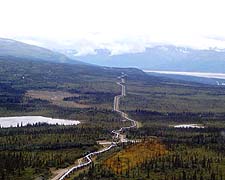TSA Joins Private Firms in Securing 2.4 Million Miles of Energy Pipelines
News & Happenings
April 17, 2007

The wind chill stood at minus 50 degrees and the sun glared dangerously bright off fresh snow in Edmonton, Alberta as TSA's Pipeline Security Division began its early-2004, cross-border assessment of a 3,300-mile pipeline system carrying 2 million barrels of oil daily between the U.S. and Canada.
Pipeline Security, a component of TSA’s Transportation Sector Network Management (TSNM) office, spent months preparing for the security assessment, carried out by a U.S.-Canada team more than 20 strong.
With the winter assessment necessitated by a Canadian deadline, warm clothing was purchased, top-notch subject matter experts hired, and rooms reserved along the route for sleeping and daily operational meetings that wrapped up 12- to 14-hour days.
Such assessments are an integral tool of the division, responsible for the security of almost 2.4 million miles of privately-owned energy pipelines operated by more than 2,000 companies. Those pipelines transmit and distribute petroleum and natural gas throughout the U.S., benefiting more than 300 million people.
Once ready, the team began its snowy trek, slogging along the snake-like pipeline, much of it through remote farm country, from Edmonton to Sarnia, Ontario, twice crossing the U.S.-Canada border.
From that bitterly cold assessment came two reports – one classified, one unclassified – on vulnerabilities, risk-based strategies for addressing them, and options as threat levels change. Critical information was shared with the Canadian government as well as the pipeline company.
Prior to the September 11 terrorist attacks, vandalism was the greatest security concern for pipeline companies, and there was no coordinated effort by the companies and government authorities to share information. That changed when TSA was created.
In September 2002, the Pipeline Security Division started with a staff of one, Jack Fox, who has headed the office in its several forms ever since. A 30-year veteran of the pipeline industry, Fox has built a team of 11, representing diverse backgrounds such as security, public health and the military. Every day, his team works closely with business executives and other government officials to develop communications that ensure an effective, risk-based approach to pipeline security.
Cross-border assessments represent just one of the division’s initiatives. Domestic corporate reviews, which also include physical assessments, are another. Approximately 80 percent of U.S. pipeline commerce is conducted by only 5 percent – or about 100 – of the industry’s companies. The pipeline division began those reviews in April 2003 to learn about critical pipeline infrastructure and the actions companies are taking to mitigate vulnerabilities.
Reviews also offer the strategic benefit of face-to-face contact between TSA and company executives, building mutual trust and shared ownership of solutions to security challenges.
Other TSA pipeline security initiatives include monthly conference calls with company officials, a weekly suspicious incidents update shared with the companies, an annual pipeline security forum, and security training assistance that includes a new compact disc on security awareness.
"These efforts, plus enthusiastic cooperation from pipeline stakeholders," said Fox, "go a long way to ensure secure transportation of these crucial resources."


